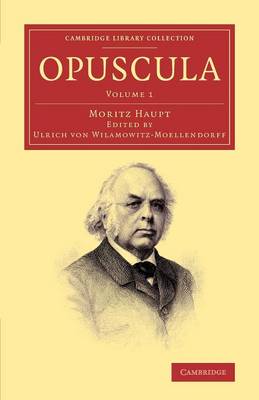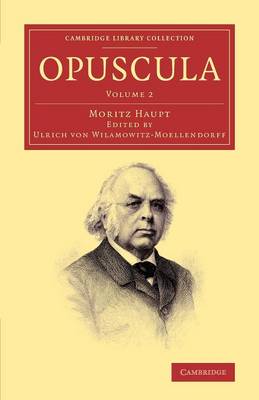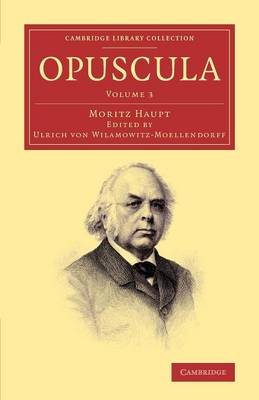Cambridge Library Collection - Classics
4 total works
A prolific philologist of both the German and classical languages, Moriz Haupt (1808–74) enjoyed a successful academic career at the universities of Leipzig and Berlin. As well as founding the Zeitschrift für deutsches Altertum, which is still published, he was a painstaking yet somewhat bold editor of many classical texts. In the years immediately following his death, his shorter works were gathered together in this three-volume collection, edited by fellow philologist Ulrich von Wilamowitz-Moellendorff (1848–1931). Volume 1 (1875) contains essays by Haupt in both Latin and German on a variety of classical subjects. Included here are his Quaestiones Catullianae (1837), an analysis of a fragment of a Pindaric dithyramb, and a commentary on the bucolic poems of Calpurnius and Nemesianus. This work remains of value to researchers interested in the history of classical scholarship, particularly the significant contributions made by German scholars in the nineteenth century.
A prolific philologist of both the German and classical languages, Moriz Haupt (1808–74) enjoyed a successful academic career at the universities of Leipzig and Berlin. As well as founding the Zeitschrift für deutsches Altertum, which is still published, he was a painstaking yet somewhat bold editor of many classical texts. In the years immediately following his death, his shorter works were gathered together in this three-volume collection, edited by fellow philologist Ulrich von Wilamowitz-Moellendorff (1848–1931). Volume 2 (1876) contains the Latin text of forty-two lectures delivered by Haupt twice a year at the University of Berlin between 1854 and 1874. The lectures cover a variety of topics concerning classical texts, philology and literature, including an exposition of the forgeries by Simeon Bosius of the texts of Catullus. This work remains of value to researchers interested in nineteenth-century German classical scholarship.
A prolific philologist of both the German and classical languages, Moriz Haupt (1808–74) enjoyed a successful academic career at the universities of Leipzig and Berlin. As well as founding the Zeitschrift für deutsches Altertum, which is still published, he was a painstaking yet somewhat bold editor of many classical texts. In the years immediately following his death, his shorter works were gathered together in this three-volume collection, edited by fellow philologist Ulrich von Wilamowitz-Moellendorff (1848–1931). Volume 3 (1876) originally appeared in two parts, which are reissued here together. Among the articles in German and Latin are a discussion of a fragment of the eulogy for the Ostrogoth king Theodahad and a talk given at the celebration of the Kaiser's birthday in 1871. This work remains of value to researchers interested in nineteenth-century philology, particularly the significant contributions made by its German practitioners.
A prolific philologist of both the German and classical languages, Moriz Haupt (1808-74) enjoyed a successful academic career at the universities of Leipzig and Berlin. As well as founding the Zeitschrift fur deutsches Altertum, which is still published, he was a painstaking yet somewhat bold editor of many classical texts. In the years immediately following his death, his shorter works were gathered together in this three-volume collection, edited by fellow philologist Ulrich von Wilamowitz-Moellendorff (1848-1931). Volume 1 (1875) contains essays in both Latin and German, including Haupt's Quaestiones Catullianae (1837). Volume 2 (1876) contains the Latin text of forty-two lectures delivered by Haupt twice a year at the University of Berlin between 1854 and 1874. Volume 3 (1876) originally appeared in two parts, which are reissued here together. This collection will be of value to researchers interested in the history of classical scholarship, particularly its German practitioners.



